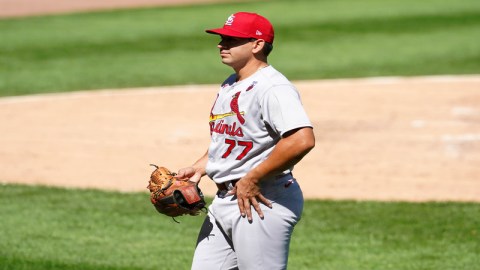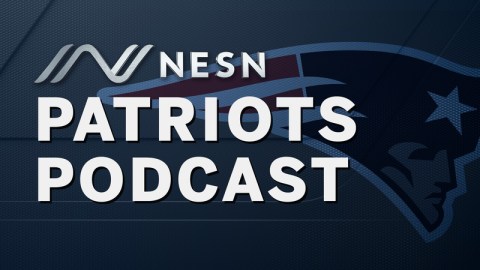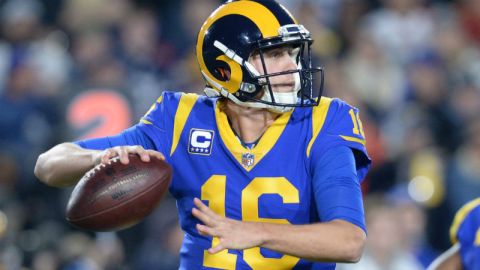CHESTNUT HILL, Mass. — Ron Brace's grandmother joked that she nearly put his Boston College football helmet on while the tornadoes hit Springfield on Wednesday. Before the storms, Brace's father was outside taking pictures and videos.
Now that Brace knows his family and friends are safe, it's a little easier for him to smile while retelling their stories, but Wednesday was a fairly nerve-wracking day for the Patriots defensive lineman, whose family lives in Western Mass.
When the tornado warnings started, Brace recalled a similar instance when he was younger and nothing arose from the weather pattern. So, at first, he figured it would be the same thing all over again. Then, when someone told Brace it had started hailing, he feared it wasn't just a false alarm.
Brace went home Thursday to check on his family and see the wreckage for himself. There was some damage to his porch at the house where he grew up, but it escaped anything major.
"I just went down there to check out my family to see how they were doing, called them to make sure nobody was physically damaged," Brace said Friday. "But everybody had their own pictures of how devastating it was. A whole bunch of trees were uprooted. My father was downtown at his office near where it happened, too. My cousin even saw a tornado go by his window, so it was crazy."
Brace drove past some buildings that were ripped to shreds, and he shook his head knowing he had been inside them before. He said there were parts of the city that hardly resembled his home town.
"It was a big deal, like in the harder parts, the less-fortunate parts, those parts seemed to get affected more than anything," Brace said. "The nicer parts of Springfield, the more upscale parts, they didn't really see any damage. It was more of the lower-class part, the part where I grew up. Those were the parts that were really jacked up."
Brace said his grandmother's house was unaffected, and that's where he visits most often. He was clearly concerned about the well-being of his city, but most importantly, he was elated that his family made it out in good health.
"I knew they were a little bit scared, but they know how to handle themselves. Everybody ended up coming out safe, so that's all I was worried about," Brace said. "The next morning, I called everybody. Everybody picked up, so I couldn't ask for anything more to come out of that."
Considering that for two decades, a long-running storyline in Shaquille O'Neal's career was the quest to be the most dominant player of all time, it's sad that things ended the way they did.
After 28,596 career points, four championships and a resume that drew comparisons to Kareem Abdul-Jabbar and Wilt Chamberlain, Shaq knew he'd reached the end of the road when he could barely even suit up. His career ended with him playing only 12 total minutes in a five-game series loss to the Miami Heat.
That's when he knew it was time to walk away. The "Most Dominant Ever" could hardly walk, let alone take over a playoff series.
"I was very down on myself," O'Neal said at his Friday retirement news conference in Orlando. "I had tears in my eyes. I was upset, talking to my father, talking to my girlfriend, talking to my kids, just very upset. I tried, and I just couldn't pull it off.
"I even did things that my father always told me never to do. He said, 'Never take the shot.' But I wanted to play so bad, I wanted help Boston so bad, so shot here. Didn't work. So let me try another shot, let me try a different shot. I finally played one game in Boston, I went home and watched the game, and I looked terrible. That's not the way I wanted to go out."
We've spent two decades watching Shaq get his way in every walk of life. In basketball, he was an individual superstar as well as a champion. In show business, he was a rapper, actor and reality TV star. Out in the world, he was a sheriff, a symphony conductor and even a human statue in Harvard Square.
His career brought him more success, in more ways, than any athlete in recorded history this side of maybe Babe Ruth. But the final season brought him failure.
He came to Boston last August on a minimum contract. He didn't care about the money — he'd already banked $300 million from playing salaries alone. He was here to win. He had four championships under his belt already, and he wanted a fifth. His newfound motto in this town was 18-2-5 — 18 titles for the Celtics in their history, two for Doc Rivers and his four All-Star leaders, and five for Shaq himself. He was in this for himself, and he was in it for Boston too.
He was here for the good of the team, but he had to walk away for that same reason.
"The Boston organization was very very good to me," O'Neal said. "I talked to Dr. Brian McKeon, who's a fabulous doctor, and he told me the best solution was to go in and clean it out, and then a nine-month recovery. I thought it was good business to [retire and] let Danny Ainge know right away, so they could get some young talent. They're a beautiful organization, and they've still got a lot left. I didn't want to let happen the same thing that happened last year.
"I'm a competitor. I'm a fighter. After we lost, I was really down on myself, because I went in there with one mission only, and I felt that I left the city down. I didn't want that to happen again."
Shaq's been through a lot of nicknames over the last two decades, but the original one was "Superman." It's only now, at 39, that the big man is beginning to look human.
Years from now, we'll look back on Shaquille O'Neal and remember all the success, all the domination. But for now, Shaq's legacy is a bittersweet one.



